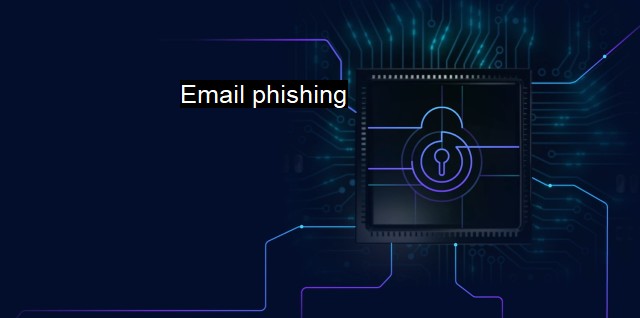What is Email phishing?
The Increasing Sophistication of Email Phishing and How Antivirus Software Provides a Defence Against Cybercrime
Email phishing is a term used in cybersecurity to describe a form of cyber-attack that criminals use to trick unsuspecting individuals into divulging sensitive data such as passwords, credit card numbers, and Social Security numbers. At the core of any phishing attempt is a fraudulent communication, usually an email, that is designed to appear legitimate.Why do cyber criminals employ phishing strategies? Quite simply, it is because email is a pathway to valuable information. With the correct password or privately identifiable data, these criminals can commit identity theft, drain bank accounts, or even steal corporate secrets.
Every phishing attack operates in much the same way. First, a user is tricked into thinking that the email is from a trustworthy source. The email might be made to look as if it’s from a bank, a well-known commercial website, or a social media site. It might also use logos, names, or wording that seem to be legitimate, often with slight tweaks or misspellings designed to imitate the original almost perfectly.
On clicking a link in the authentic-looking email, users are taken to a webpage that looks just like the real thing but is, in reality, a replica designed for deceit. Cybersecurity professionals often call these imitation sites, ‘spoofed’ sites. At this point, the user is asked to enter login details, financial data, or other personal information. Once this happens, the cybercriminal has succeeded in their goal — they gain access to the user's data and can proceed to exploit it for financial gain or other sinister purposes.
Email phishing poses a serious threat to individuals and businesses alike. in a corporate context, compromised data could be used to access the company's financial assets, steal confidential customer information, or expose proprietary business secrets to competitors.
The use of antivirus software can help defend against email phishing to some extent by offering filters that scan and identify potentially fraudulent emails. Cybersecurity programs are continuously updated with information about the latest phishing scams and tactics. Antivirus and anti-phishing tools can warn users about the risks before they click on links or download attachments.
The adoption of public key infrastructure (PKI) which creates a mathematical pair of keys (one public and one private) can enhance encryption systems which in turn increases security levels. With PKI systems in place, if an email signed with a company’s private key gets flagged as suspicious or malicious, an updated antivirus or phishing tool can automatically identify it and either notify the recipient or completely prevent access.
In today’s interconnected world, it is worth knowing that email phishing is not limited to emails alone but also extends to other communication forms such as phone calls, text messages, and even social media messaging. All forms of phishing function on the same concept of disguising malicious intent as legitimate communication, making users believe that they converse with a person or entity they trust when, in reality, they are playing into the hands of a cyber-criminal.
Equipping oneself with knowledge and best practices of cybersecurity can go a long way in securing oneself from email phishing and other cyber threats. Regularly updating one’s antivirus software, scanning emails for suspicious contents, and never sharing sensitive information through an unverified or suspicious communication channel are practical steps everyone can take.
Email phishing, despite being one of the oldest forms of cybercrime, is still thrive because it targets the most vulnerable link in any cybersecurity defense - the human user. As technology evolves, so do the tactics employed by phishing criminals. Therefore, it is essential to continuously stay vigilant, keep abreast of the latest developments and utilize all available technology like antivirus and anti-phishing tools to ensure one's online world remains as secure as possible.

Email phishing FAQs
What is email phishing?
Email phishing is a type of cyber attack in which an attacker sends fraudulent emails to a victim in order to trick them into revealing sensitive information such as usernames, passwords, or credit card details.How can I identify an email phishing attack?
Some common signs of an email phishing attack include suspicious sender addresses, grammatical or spelling errors, urgent or threatening language, requests for personal information, or suspicious links or attachments.What can I do to protect myself from email phishing attacks?
To protect yourself from email phishing attacks, be sure to practice good email hygiene by never clicking on suspicious links or attachments, verifying the sender's email address, using strong and unique passwords, monitoring your financial accounts regularly, and keeping your antivirus and antimalware software up to date.What should I do if I think I have fallen victim to an email phishing attack?
If you think you have fallen victim to an email phishing attack, immediately change any passwords that may have been compromised, contact your financial institutions to report any suspicious activity, and consider running a full antivirus and malware scan on your device. It's also a good idea to report the email phishing attack to your email provider and/or the relevant authorities.| | A | | | B | | | C | | | D | | | E | | | F | | | G | | | H | | | I | | | J | | | K | | | L | | | M | |
| | N | | | O | | | P | | | Q | | | R | | | S | | | T | | | U | | | V | | | W | | | X | | | Y | | | Z | |
| | 1 | | | 2 | | | 3 | | | 4 | | | 7 | | | 8 | | |||||||